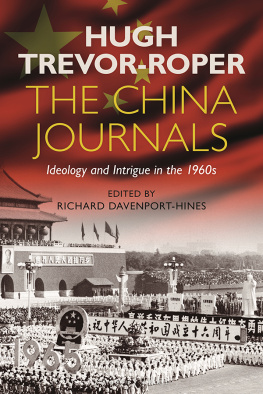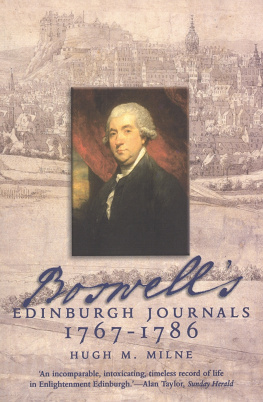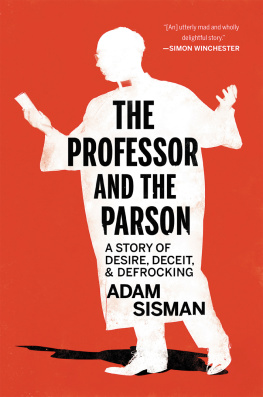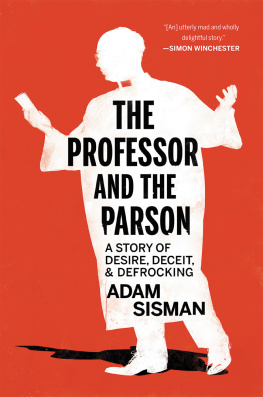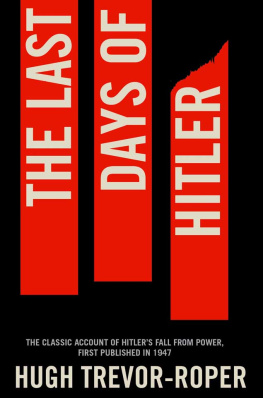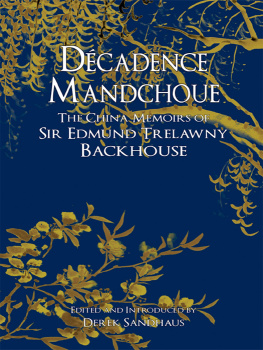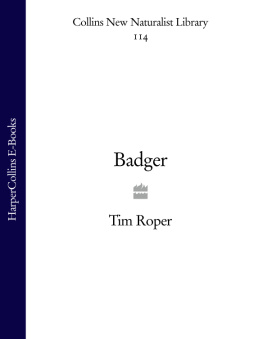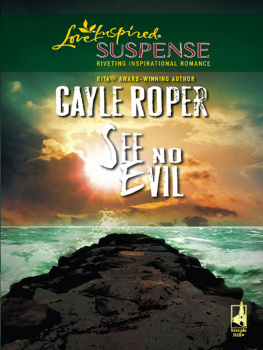Trevor-Roper Hugh - The China Journals
Here you can read online Trevor-Roper Hugh - The China Journals full text of the book (entire story) in english for free. Download pdf and epub, get meaning, cover and reviews about this ebook. publisher: Bloomsbury Publishing Plc, genre: Detective and thriller. Description of the work, (preface) as well as reviews are available. Best literature library LitArk.com created for fans of good reading and offers a wide selection of genres:
Romance novel
Science fiction
Adventure
Detective
Science
History
Home and family
Prose
Art
Politics
Computer
Non-fiction
Religion
Business
Children
Humor
Choose a favorite category and find really read worthwhile books. Enjoy immersion in the world of imagination, feel the emotions of the characters or learn something new for yourself, make an fascinating discovery.
- Book:The China Journals
- Author:
- Publisher:Bloomsbury Publishing Plc
- Genre:
- Rating:3 / 5
- Favourites:Add to favourites
- Your mark:
- 60
- 1
- 2
- 3
- 4
- 5
The China Journals: summary, description and annotation
We offer to read an annotation, description, summary or preface (depends on what the author of the book "The China Journals" wrote himself). If you haven't found the necessary information about the book — write in the comments, we will try to find it.
The China Journals — read online for free the complete book (whole text) full work
Below is the text of the book, divided by pages. System saving the place of the last page read, allows you to conveniently read the book "The China Journals" online for free, without having to search again every time where you left off. Put a bookmark, and you can go to the page where you finished reading at any time.
Font size:
Interval:
Bookmark:
The China Journals
The China Journals
Ideology and Intrigue in the 1960s
Hugh Trevor-Roper
edited by
Richard Davenport-Hines

This collection of writings by Hugh Trevor-Roper 19142003
Fellow of Oriel College, Oxford 195780 is dedicated to the memory of
Jeremy Catto | Mark Whittow |
19392018 | 19572017 |
Fellow of Oriel 19702006 | Provost-Elect of Oriel 2017 |
Judith Curthoys is the archivist nonpareil who enabled me to consult the Dacre papers at Christ Church, Oxford. I also thank the staff of the Bodleian Library, Oxford; Cambridge University Library; the Hoover Institution, Stanford University; Kings College, Cambridge; the National Archives, Kew; the School of Oriental and African Studies, London; the State Library of New South Wales; and the Working-Class Movement Library, Salford. The amenities of the London Library were once again indispensable to my work. My work on various collections of private papers held in the Bodleian was undertaken when I was the beneficiary of the Visiting Fellowship scheme at All Souls College, Oxford.
I am grateful for material or advice furnished by Tom Buchanan, of Kellogg College, Oxford; Youssef Cassis, of the European University Institute, Florence; Patric Dickinson, Clarenceux King of Arms; Simon Ertz, of the University of Stanford at Berkeley; Henry Hardy, of Wolfson College, Oxford; Mike Luft, of Oldham United Against Racism and of the Anti-Nazi League; Jeffrey Hackney, of Wadham College, Oxford; James Howard-Johnston, of Corpus Christi College, Oxford; Simon Malloch, of the University of Nottingham; Rana Mitter, of St Cross College, Oxford; Francis Pike; Frederic Raphael; Adam Sisman; Tom Stacey; John Tallon, QC, of Pump Court Tax Chambers; Hugo Vickers, Captain of the Lay Stewards of St Georges Chapel, Windsor; Peter Wellby; and Edward Wilson, of Worcester College, Oxford. Above all I am grateful to Graham Perry, for a long, candid interview in January 2019.
I thank Nicholas Garland for his consent to my use of a letter written by his mother Peggy Garland; Sara Holdsworth for permission to quote from the letters of her mother Valerie Pearl; and Jane Reilly, who has once again allowed me to quote from the unpublished memoirs of her father Sir Patrick Reilly. Extracts from the unpublished correspondence of Sir Isaiah Berlin are published with the agreement of the trustees of the Isaiah Berlin Literary Trust.
This is the fourth collection of Trevor-Ropers letters and journals that I have edited or co-edited. It has been enriched and honed by the patient criticism of Trevor-Ropers literary executor Blair Worden. I thank him for trusting me with this work, and for improving it by his careful reading, reflection and reasoning. His temperance has restrained my tendencies to excess. My admiring gratitude to my three friends who have been trustees of the Lord Dacre of Glanton Charitable Trust, Jeremy Catto, James Howard-Johnston and Sir Noel Malcolm, is hefty, fathomless and the utmost pleasure to acknowledge.
Le Meygris, 15 January 2019
Trevor-Roper used the Wade-Giles system of transliteration to spell the names of Chinese people and places. This was the system devised in the nineteenth century, and used throughout the English-speaking world for most of the twentieth. The pinyin system of transliteration was adopted by China in 1958, but did not become prevalent in the international community for twenty years. Trevor-Ropers usage was neither a mannerism nor an intentional act of cultural aggression. I have tried to maintain consistency with it.
In my editorial introduction and annotations, I prefer to use names that are entrenched in English usage, such as Taoism, Confucius, Peking, Kuomintang, rather than their pinyin versions. Similarly, Mao Zedong, Zhou Enlai and other pinyin names of individuals were unknown to Trevor-Roper when he kept these journals. It is as unthinkable to change them as to try to improve his punctuation.
I have, however, silently corrected a few misspellings of proper names: it seemed pedantic to gloss insignificant aural slips. I have modified two adjectives and one noun that might be libellous. And I have cut from Part 4 some mundanities about travel arrangements.
| AEU | Amalgamated Engineering Union |
| BBC | British Broadcasting Corporation |
| BCFA | British-China Friendship Association |
| BCPIT | British Council for the Promotion of Foreign Trade |
| CIA | Central Intelligence Agency, USA |
| CND | Campaign for Nuclear Disarmament |
| CPA | Chinese Peoples Association for Cultural Relations with Foreign Countries |
| CPGB | Communist Party of Great Britain |
| CPGBML | Communist Party of Great Britain (Marxist-Leninist) |
| FBA | Fellow of the British Academy |
| FBI | Federal Bureau of Investigation, USA |
| FCO | Foreign & Commonwealth Office |
| FO | Foreign Office |
| FRS | Fellow of the Royal Society |
| IRD | Information Research Department |
| JIC | Joint Intelligence Committee |
| KMT | Kuomintang (Chinese nationalist party) |
| LSE | London School of Economics |
| MI | Military Intelligence |
| NATO | North Atlantic Treaty Organisation |
| NKVD | Peoples Commissariat for Internal Affairs, Russia |
| OSS | Office of Strategic Studies, USA |
| SACU | Society for Anglo-Chinese Understanding |
| PPE | politics, philosophy and economics (Oxford) |
| PRC | Peoples Republic of China (mainland China) |
| RAB | Radio Analysis Bureau |
| ROC | Republic of China (Taiwan) |
| SIGINT | signals intelligence |
| SIS | Secret Intelligence Service |
| SOAS | School of African and Oriental Studies, London |
| SS | Schutzstaffel, Germany |
| UNESCO | United Nations Scientific, Educational & Cultural Organisation |
| UNRRA | United Nations Relief & Rehabilitation Administration |
Most of Hugh Trevor-Ropers writings were on European subjects. His command of languages, although formidable, was restricted to European tongues and their classical antecedents. Yet his historical enquiries, which recognized no boundaries of time, likewise acknowledged no limits of geography. Interested in non-European civilizations for themselves, he was also drawn to them by his instinct for historical comparison and by his belief that the distinctiveness of European history can be grasped only by enlarged perspectives. Thus he encouraged his friends to read Edward Evans-Pritchards pioneering work of African anthropology, Witchcraft, Oracles and Magic among the Azande (1937), which showed a system of rational consistency and coherence totally different from that of Christian Europe; and relished Robin Zaehners The Dawn and Twilight of Zoroastrianism (1961), which led him to think comparatively about the great monotheisms, Judaism, Christianity and Islam.
Of non-European civilizations it was the Chinese that interested him most. He was captivated by the successive volumes of Science and Civilisation in China by the biochemist and historian Joseph Needham, which began publication in 1954. During an otherwise hostile review of R. H. Tawneys collection of essays
Next pageFont size:
Interval:
Bookmark:
Similar books «The China Journals»
Look at similar books to The China Journals. We have selected literature similar in name and meaning in the hope of providing readers with more options to find new, interesting, not yet read works.
Discussion, reviews of the book The China Journals and just readers' own opinions. Leave your comments, write what you think about the work, its meaning or the main characters. Specify what exactly you liked and what you didn't like, and why you think so.

